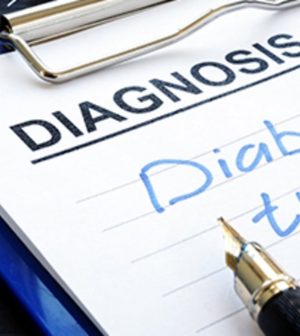- Could Your Grocery Store Meat Be Causing Recurring UTIs?
- Are You Making This Expensive Thermostat Error This Winter?
- Recognizing the Signs of Hypothyroidism
- 10 Strategies to Overcome Insomnia
- Could Artificial Sweeteners Be Aging the Brain Faster?
- Techniques for Soothing Your Nervous System
- Does the Water in Your House Smell Funny? Here’s Why
- Can a Daily Dose of Apple Cider Vinegar Actually Aid Weight Loss?
- 6 Health Beverages That Can Actually Spike Your Blood Sugar
- Treatment Options for Social Anxiety Disorder
Is Your Child With Type 1 Diabetes Facing ‘Diabetes Distress’?

Children born with type 1 diabetes are much more likely to develop certain mental health issues than those without the condition, a new study warns.
Kids with type 1 diabetes are more than twice as likely to develop a mood disorder and 50% more likely to suffer from anxiety than other children, researchers reported June 17 in the journal Nature Mental Health.
They also are more than four times as likely to develop behavioral issues like eating or sleep disorders, researchers said.
However, the findings suggest this isn’t due to any specific health problem caused by type 1 diabetes.
Rather, children appear to be vulnerable to “diabetes distress” resulting from the ongoing management of their chronic condition, researchers said.
“This emphasizes the importance of prevention and sustained attention to the mental health needs of children and young people with type 1 diabetes,” said lead researcher Tomas Formanek, a doctoral student with the University of Cambridge in the U.K. and the National Institute of Mental Health, in Klecany, Czech Republic.
Type 1 diabetes occurs when the immune system turns on the pancreas, the organ that produces insulin. Damage to the pancreas destroys its ability to make insulin, or decreases production so much that people need to take insulin to live.
For the new study, researchers analyzed data for more than 4,500 children with type 1 diabetes in the Czech Republic.
The mental health effects found among these kids might stem from their need to make significant changes to their lives, researchers said. They must constantly monitor their food intake, check their blood sugar levels and inject themselves with insulin.
This often leaves kids feeling excluded from social events and singled out by other kids, teachers and even family members, researchers said.
“We know that people diagnosed with type 1 diabetes can experience ‘diabetes distress,’” senior researcher Benjamin Perry, a clinical lecturer in psychiatry with the University of Cambridge, said in a university news release. “This can include extreme frustration with blood sugars and feelings of isolation and can lead to burnout, hopelessness and a feeling of lack of control. It’s little wonder, then, that they are at risk of compounding mental health problems, spanning into their adult lives.”
More information
The American Diabetes Association has more about type 1 diabetes.
SOURCE: University of Cambridge, news release, July 17, 2024
Source: HealthDay
Copyright © 2026 HealthDay. All rights reserved.










